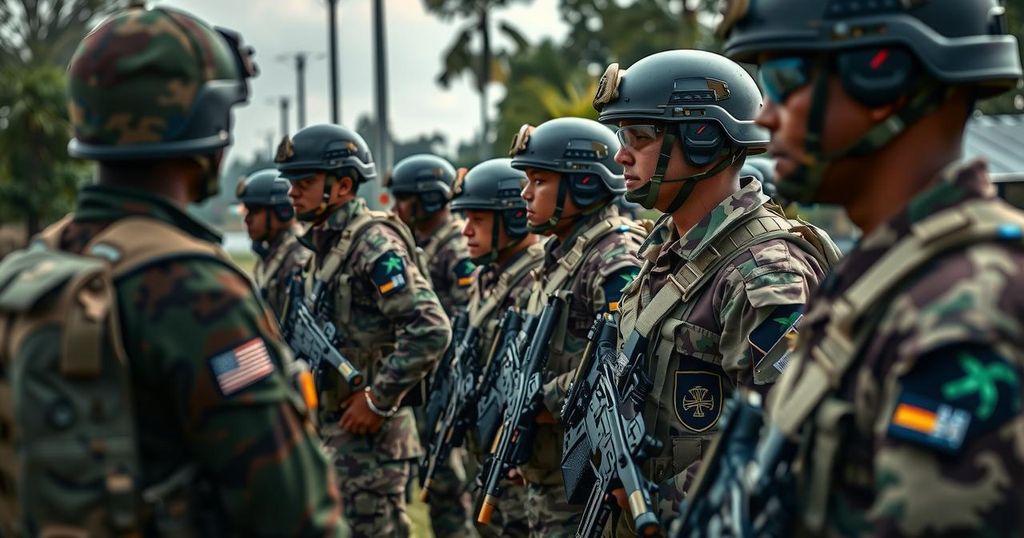East DR Congo Truce Monitoring Unit Set to Begin Amid Renewed Violence

A truce-monitoring unit between the Congolese army and M23 rebels will be launched on Tuesday, following renewed M23 offensives in eastern DR Congo. The rebels have captured new territory, worsening a humanitarian crisis. Concerns arise over the effectiveness of the ceasefire agreement as the DRC accuses Rwanda and M23 of seizing control before monitoring begins. Pinga faces a population influx, straining local health resources.
On Tuesday, a unit designated to monitor a truce between the Congolese army and Rwanda-backed rebels is set to commence its operations, as announced by the ceasefire broker, Angola. This initiative comes amidst recent territorial gains by the M23 militia, an ethnic Tutsi group, in eastern Democratic Republic of Congo (DRC), which has exacerbated an ongoing humanitarian crisis resulting in the displacement of thousands since 2021. Despite a ceasefire agreement that was reached in August stabilizing the front, the M23 has resumed its offensive in North Kivu province since late October, targeting the strategically significant loyalist town of Pinga. Reports indicate that the rebels executed an attack in Lubero territory towards Lake Edward, an area bordering Uganda. Following engagements with the Wazalendo coalition, which supports the Congolese military, the M23 successfully captured the town of Kamandi Gite. Allegations have surfaced from the DRC, claiming that both Rwanda and the M23 are exploiting the truce to expand their territorial control prior to the establishment of monitoring protocols. Angola has confirmed that it will lead this observational force, which will include officers from both the Congolese and Rwandan armies. In Pinga, a recent clash between the DRC army, allied militias, and M23 fighters did bring a temporary calm, yet the town is currently experiencing a surge in displaced individuals, compounding its existing challenges. The local health infrastructure is struggling to cope with the influx. “The hospital has no medicine, the toilets are in a bad state, and access to water is a problem. We fear the appearance of serious illnesses… that will be difficult for us to treat,” stated Theophile Mukandirwa, the director of the Pinga hospital. The DRC’s eastern region, rich in minerals, has grappled with persistent violence, both domestic and from neighboring nations, for nearly thirty years.
The ongoing conflict in eastern Democratic Republic of Congo has deep-seated roots, primarily revolving around ethnic tensions, regional instability, and competition for valuable mineral resources. The M23 militia, which primarily comprises ethnic Tutsis, emerged against a backdrop of historical grievances and geopolitical dynamics involving Rwanda. Since its resurgence in 2021, the group has exacerbated the humanitarian situation in the DRC, leading to widespread displacement and a significant crisis in the region. Various ceasefire agreements have been brokered in attempts to manage the conflict, yet skirmishes persist, complicating stabilization efforts. Moreover, the influx of displaced individuals into towns like Pinga highlights the strain on local resources and public health systems, revealing the dire humanitarian needs that arise from prolonged conflict. International and regional actors, including Angola, have sought to mediate peace through monitoring units, aiming to revive stability in this volatile area.
In conclusion, the launch of the truce-monitoring unit on Tuesday represents a critical step in efforts to stabilize the conflict between the Congolese army and the M23 rebel group. However, the resurgence of hostilities by the M23 raises concerns about the effectiveness of the ceasefire agreement and the potential for further territorial gains prior to the monitoring unit’s deployment. The humanitarian implications for affected regions, particularly Pinga, underscore the urgent need for comprehensive assistance in addressing both immediate and underlying issues stemming from decades of conflict.
Original Source: www.enca.com








